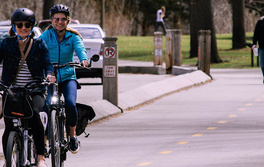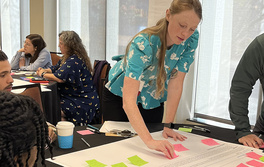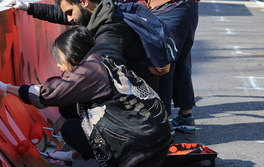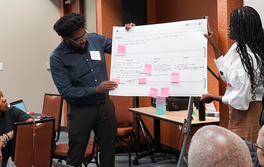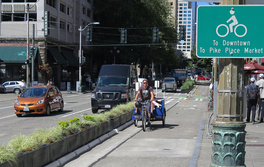
STATEMENT: NUMO Supports Investments in Public Transit, Walking, Cycling for Transportation Decarbonization in Build Back Better Act
The following is a statement from Harriet Tregoning, director of NUMO, the New Urban Mobility alliance, on the Build Back Better Act, also known as the United States federal budget reconciliation bill.
As the United Nations Climate Change Conference (COP26) kicks off, the United States Congress is looking to pass two major infrastructure bills and put the U.S. on track to reaching its goal of 50-52% greenhouse gas (GHG) emissions reductions, compared to 2005 levels, by 2030. The latest version of the Build Back Better Act, also known as the budget reconciliation bill, includes a host of promising provisions aimed at decarbonizing the transportation sector, which is the greatest contributor by sector to U.S. emissions. Among these provisions is a significant electric vehicle (EV) tax package. EVs are critical to achieving climate goals, but their deployment alone will not be enough to reach critical emissions reduction goals. Simultaneously, we must also stay focused on the other major piece of the decarbonization puzzle: cutting vehicle miles traveled and shifting travel toward more efficient, less carbon-intensive modes like public transportation, walking and cycling.
Last week the World Resources Institute and partners published the State of Climate Action Report 2021: Systems Transformations Required to Limit Global Warming to 1.5°C, which finds that the world is going in the wrong direction in reducing the share of trips made by private light-duty vehicles. Earlier this year, analysis from the Rocky Mountain Institute found that the U.S. must reduce vehicle miles traveled by 20% before the end of the decade to limit global warming to 1.5°C.
At the same time, the U.S. Department of Transportation released new statistics last week showing that the cost of car ownership and the number of motor vehicle fatalities are rising. In the U.S. car ownership has become a prerequisite for economic mobility, as low-density land use patterns and inadequate investments in public transportation over the past century have resulted in more driving to reach jobs, education and daily necessities, as well as burdening the lowest-income Americans with high transportation expenses. Residents in many parts of the U.S. can only access jobs with car ownership, which comes at a high cost — the lowest-income 20% of the population spends an average of 35% of their income on transportation expenses, and the Center for Neighborhood Technology estimates that only 26% of U.S. neighborhoods are affordable when housing and transportation costs are combined. Putting more cars on the road — even if they are electric — rather than prioritizing more affordable and efficient modes will exacerbate existing inequities and won’t reduce how much we drive.
NUMO enthusiastically supports the following provisions included in the Build Back Better Act, which will help support public transit and active travel modes. These investments in a multimodal transportation system that provides access to jobs and services for all will help the U.S. reach transportation decarbonization goals and ensure equitable access to the economy:
- The Affordable Housing Access Program, which would provide $10 billion to support access to affordable housing and enhance mobility to expand access to job and educational opportunities, as well as community services, for low-income households and residents of historically-underserved communities.
- Reinstating and expanding employer-provided fringe benefits for bicycle commuting that includes bike and scooter share
- Establishing a 30% tax credit for certain new electric bicycles for up to $1,500 to expand access to electric micromobility
- Community Climate Incentive Grants to reduce surface transportation-related GHG emissions, including funds for the Federal Highway Administration to take steps to ensure the reduction of on-road GHG emissions, including establishing GHG performance measures and the creation of incentives for states that demonstrate significant carbon reductions
- Neighborhood Access and Equity Grants to address neighborhood equity, safety and affordable transportation access, including investment for competitive grants administered by the Federal Highway Administration to reconnect communities divided by infrastructure barriers, mitigate negative impacts of transportation projects on underserved communities and support equitable transportation planning and community engagement activities
- Environmental and Climate Justice Block Grants for community-led initiatives in underserved communities and to build community capacity-building centers to address disproportionate environmental and public health harms related to pollution and climate change
In addition to the positive provisions above, to further improve the equity and impact of the bill’s investments, Congress could adjust the EV tax incentives to have parity for income caps across modes.
Once the Build Back Better Act is passed and we turn the corner toward more equitable, affordable, accessible and zero-emission transportation, we can consider further examples of how to incentivize EV adoption while increasing equity and impact. These goals can be accomplished through stricter CAFE standards and market-based policies, such as feebates and road pricing, that reward lower-polluting vehicles while requiring higher-polluting vehicles to pay for their negative externalities.
NUMO looks forward to working with the Biden-Harris administration and Congress to ensure that we meet the urgent needs of this moment to decarbonize U.S. transportation and create a more equitable and sustainable transportation system for all.
Please direct media inquiries to Madlyn McAuliffe at madlyn@numo.global.
NUMO, the New Urban Mobility alliance, is a global organization that channels tech-based disruptions in urban transport to create joyful cities where sustainable and just mobility is the new normal. Founded in 2019 as an outgrowth of the Shared Mobility Principles for Livable Cities, NUMO convenes diverse allies and leverages the momentum of significant revolutions in mobility to target urban issues — including equity, sustainability, accessibility and labor — impacted by the shifting transportation landscape. NUMO is hosted by WRI Ross Center for Sustainable Cities.
Header image: Aimee Custis/Flickr
